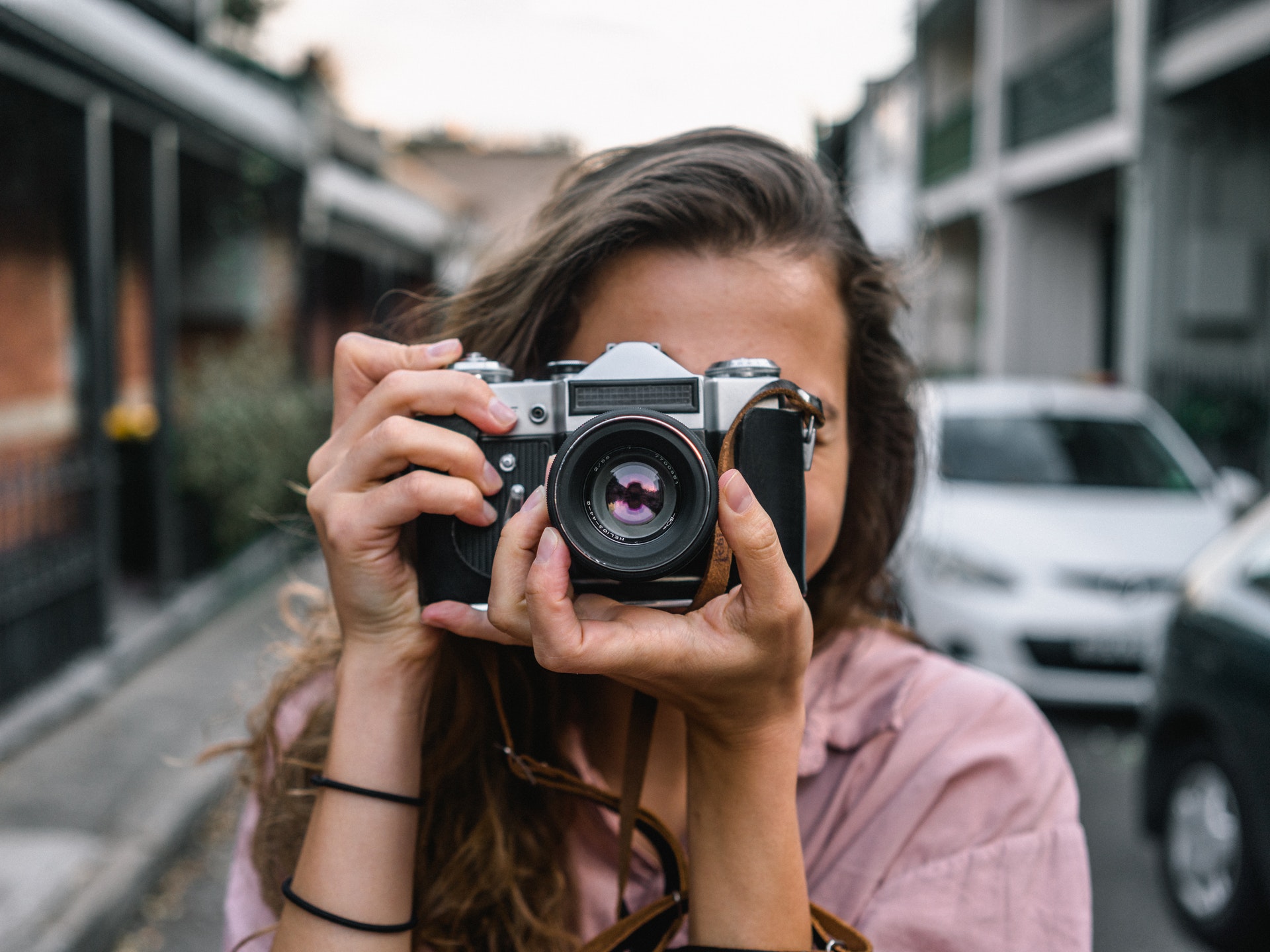This entry was posted on July 16, 2021.

For some time, the DSLR has been the primary (or exclusive) tool of choice for discerning amateur and professional photographers. Nothing else has been afforded a glance after DSLR technology set the standard for the entire sector.
Recently, however, the market for mirrorless cameras has been attracting attention on a widespread basis. Designed to combine the practicality of a point-and-shoot camera with the features of a DSLR, mirrorless cameras claim to deliver the best of both worlds.
All in a significantly lighter and more compact form for added portability, with no loss of quality.
But is this too much to ask from a comparatively affordable mirrorless camera? Is mirrorless camera technology a viable replacement for DSLR hardware, or are the two inevitably separated in any important ways?
What is a Mirrorless Camera?
A mirrorless camera - formally known as a mirrorless interchangeable lens camera (MILC) - is a compact interchangeable camera system. They use a digital imaging sensor in place of a movable mirror and pentaprism, in order to reflect a digital preview of what the lens is picking up on the electronic viewfinder.
By excluding the movable mirror and pentaprism from its design, a mirrorless camera can be made much smaller and lighter than a comparable DSLR. This tends to be the primary point of appeal for many mirrorless camera customers, who find them significantly more convenient to carry and handle.
Mirrorless cameras are available with a variety of image sensor sizes - full-frame, APS-C, Micro Four Thirds, and 1-inch. They are compatible with multiple lenses just like a DSLR, and often provide access to as many features and functionalities.
Mirrorless vs DSLR: The Key Differences
As touched upon above, the most important difference between a mirrorless camera and a comparable DSLR is its physical dimensions.
Ideal for travelling and outdoor use, a mirrorless camera will almost always be significantly smaller, lighter and more portable than a similarly capable DSLR.
In terms of lens selection, there are currently far more interchangeable lenses available for DSLRs than mirrorless cameras. But as interest in mirrorless camera technology grows among amateurs and professionals alike, this balance is changing; manufacturers are rapidly producing more lenses for mirrorless cameras than ever before.
The disparity between the two segments of the market is closing rapidly. And there are already adapted cameras available to allow DSLR lenses to be used on mirrorless bodies.
How Does a Mirrorless Camera Work?
A traditional DSLR camera captures images when light enters the lens, passes through the aperture and is reflected by a reflex mirror into the pentaprism; this results in the image that you see through the viewfinder.
With a mirrorless camera, there is no mechanical mirror mechanism whatsoever.
Instead, the light that enters the lens is channelled straight to the sensor. This presents a digital version of what the lens is seeing at the time on the electronic viewfinder (or screen).
Reasons To Buy a Mirrorless Camera
The two most common reasons for buying a mirrorless camera are:
- For travelling - the lightweight and compact nature of a mirrorless camera is ideal for taking on the road. Many photographers favour them for exploring the great outdoors.
- For everyday use - the fact that it is easy to carry a mirrorless camera around makes it the perfect choice for keeping on your person at all times of day and night.
One of the most common mirrorless camera assumptions is that the technology is more suitable for beginners than seasoned photographers. Don’t be fooled by this misnomer. In reality, a quality mirrorless camera can hold just as much appeal for pros as novices.
For the beginner, a mirrorless camera is a comparatively simple device that’s easy to get to grips with and affordable. This makes for a great introduction to the world of high-quality photography; newcomers can learn the ropes without spending a fortune.
Plus, the compactness and portability of mirrorless cameras means you’re technically likely to get more use out of them. You can carry one with you wherever you go, taking advantage of every opportunity to practice your new hobby.
For the seasoned photographer, a good mirrorless camera is the ultimate sidekick for your main DSLR rig. Where it’s impossible, impractical or simply inconvenient to pack your primary camera and accessories, a solid mirrorless camera is the next best thing.
Again, this opens the door to capturing far more memorable moments and inspiring shots on a day-to-day basis. Every seasoned photographer needs a reliable backup camera - why not a top-rated mirrorless camera?

Fixed Lens vs Interchangeable Lenses
Keep in mind when you’re shopping for a mirrorless camera - not all models support interchangeable lenses. There are some that feature a permanent lens that cannot be modified or swapped out, so it’s worth considering which is the best option for you.
- Interchangeable Lenses: Seasoned photographers and aspiring experts will find themselves severely limited by a fixed lens. Since there’s no such thing as a genuine ‘one size fits all’ lens, the interchangeable option comes highly recommended for more experienced photographers.
- Fixed Lens: For the entry-level newcomer, a high-quality fixed lens will usually be more than sufficient. Plus, third-party lens adapters and filters are usually available. These can more or less be bolted on to the end of the fixed lens to change how it captures images.
Neither of the above is necessarily ‘better’ or ‘worse’ than the other. It’s entirely down to your own personal preferences.
What Are the Main Selling Points of a Mirrorless Camera?
Roughly summarised, the main points of appeal with a good quality mirrorless camera are as follows:
- The ability to take DSLR quality photographs
- Much more compact and lightweight design
- Options available to suit all budgets
- Inclusion of a touchscreen on most new models
- Interchangeable lenses
- Adapters for DSLR lens compatibility
- Capable of shooting 4K video
- Ability to shoot RAW (for advanced users)
- Comparatively easy to get to grips with
- Easy point-and-shoot operation for newcomers
Features and functionalities vary significantly from one model to the next. Be sure to compare all available options before choosing the right mirrorless camera for you.

The Pros and Cons of Mirrorless Cameras
Rounding things off, mirrorless cameras are like all photographic hardware in that they have their own unique pros and cons.
If you’re still on the fence, consider the following before deciding on your ideal camera:
The Pros of Mirrorless Cameras
- Lightweight and compact design. Significantly easier and more convenient to carry than any comparable DSLR. Perfect for travel and taking out and about on a day-to-day basis.
- Silent operation. With no mechanical mechanisms and moving parts, a mirrorless camera can take images silently where discretion is a priority.
- Superior video quality. Most decent mirrorless cameras can shoot video at the same kind of quality as a much more expensive DSLR.
- Ease of use. The average mirrorless camera is also easier to get to grips with than a comparable DSLR. This makes them a great choice for newcomers and the inexperienced.
The Cons of Mirrorless Cameras
- Shorter battery life. Since mirrorless cameras swap mechanical mechanisms for powered technology, the system inherently puts a bigger strain on the camera’s battery.
- Fewer lenses available. For the time being at least, the market for DSLR lenses (particularly second-hand lenses) is exponentially larger and more varied.
- Value for money. If you’re already a seasoned pro who knows how to get the best out of any type of camera, you’ll get better value for money out of a DSLR.
All Choice, No Compromise
Choosing between a DSLR and a mirrorless camera does not have to mean compromising in any area. Some mirrorless cameras are superior to some DSLRs in every way, and vice versa.
Ultimately, it’s about finding which of the two works for you and the type of camera you’re most comfortable with. Not to mention, a camera that sports the kinds of features and functionalities you’ll actually use.






